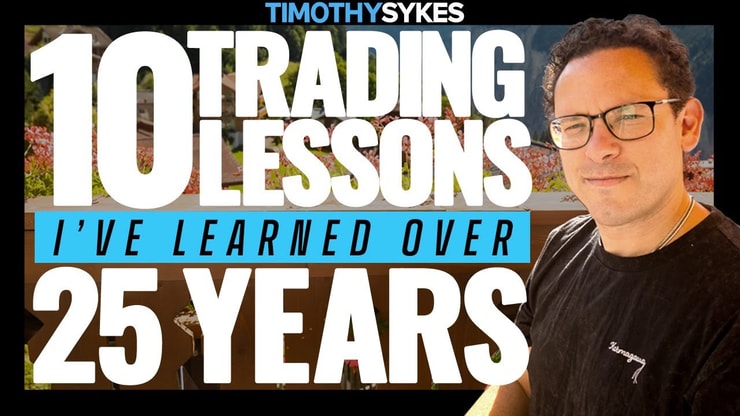Entering the stock market can be a thrilling but daunting journey, especially for beginners. With the right approach and understanding, however, it becomes a pathway to potential financial growth and wealth building. This guide will help you navigate the basics of the stock market and provide essential tips to start your investment journey effectively.
You should read this article because it offers essential tips and insights for beginners to start their stock market journey effectively, drawing from years of trading and teaching experience.
I’ll answer the following questions:
- How do stocks make money?
- What are some beginner stock market tips?
- How can you establish investment goals and risk tolerance?
- What should you know about choosing your investment account?
- What are smart stock selection and portfolio building strategies?
- Why is a long-term investment strategy beneficial?
- What are key takeaways for beginners in the stock market?
- How can beginners manage their stock portfolio effectively?
Let’s get to the content!
Table of Contents
- 1 What Is the Stock Market?
- 2 Top 4 Beginner Stock Market Tips
- 3 Best Stocks for Beginners
- 4 Key Takeaways
- 5 Frequently Asked Questions
- 5.1 How Do I Invest $100 in Stocks?
- 5.2 Can You Invest in Stocks with Little Money?
- 5.3 What Are the Best Stocks for a Starter Portfolio?
- 5.4 What Are Essential Financial Instruments for Beginners?
- 5.5 How Important Is Investment Advice for New Investors?
- 5.6 What Should Beginners Know About Loans and Debt Management?
- 5.7 Why Are Planning and Analysis Important in Investing?
- 5.8 What Do Beginners Need to Know About Trading and Brokers?
- 5.9 How Do Insurance and Savings Contribute to Financial Stability?
- 5.10 What Are Key Aspects of Personal Finance Management?
- 5.11 How Can Investment Platforms and Tools Aid Beginners?
- 5.12 How Important Are Client and Professional Relationships in Finance?
- 5.13 What Should Beginners Understand About the Market and Economy?
- 5.14 How Does Career Choice Impact Investment Decisions?
- 5.15 What Are Basic Investment Principles Every American Should Know?
- 5.16 What Role Do Banks and Financial Planners Play in Personal Finance?
- 5.17 How Important Is Understanding Ownership and Financial Details in Investments?
- 5.18 What Are Some Common Financial Misconceptions to Avoid?
- 5.19 How Should Americans Approach Lump Sum Investments and Cash Management?
What Is the Stock Market?

The stock market is where the potential of businesses and the aspirations of investors converge, offering a dynamic platform for buying and selling company shares. It’s not just a place for transactions but a reflection of the economy, showcasing how companies, from small businesses to global giants like Apple or Microsoft, perform financially.
As an expert who has navigated these markets and taught others, I’ve seen how the stock market can be a powerful tool for wealth creation.
It’s an arena filled with diverse opportunities, from traditional stocks and bonds to emerging options like ESG investments and cryptocurrencies. Understanding the stock market involves more than just knowing about stocks; it’s about comprehending a range of financial products, including mutual funds, ETFs, and retirement accounts, and recognizing how external factors like mortgage rates, banking trends, and economic news influence it.
For beginners, it’s crucial to approach the stock market with a mind open to learning and a willingness to seek advice from experts, whether through articles, financial advisors, or investment research. Remember, successful investing is as much about managing emotions and expectations as it is about analyzing data and performance.
How Do Stocks Make Money?
Stocks can generate returns in two primary ways: through price appreciation and dividends. Price appreciation occurs when the value of a stock increases, allowing investors to sell it for a profit. Dividends, on the other hand, are payments made by companies to their shareholders, often a portion of their profits. Understanding how these work is crucial for beginners. It’s not just about picking the right stock; it’s about knowing when to hold or sell, and how these decisions align with your broader investment goals. My years of trading have taught me that patience and a well-thought-out strategy are just as important as the initial selection of stocks.
Top 4 Beginner Stock Market Tips

Navigating the stock market as a beginner can be overwhelming, but with the right guidance and strategies, it can also be incredibly rewarding. Drawing from years of trading and teaching experience, I’ve crafted four key tips that can help novice investors start their journey on solid ground.
Here’s a freebie — keep a watchlist!
In the world of trading, building a watchlist is an essential tool for tracking market movements and staying ahead of the game. A watchlist helps you keep an eye on specific stocks, sectors, or industries, allowing you to make timely decisions based on current market circumstances. It’s not just about having a list; it’s about understanding the reasons behind each pick and how they align with your trading strategy. For traders looking to build an effective watchlist, check out my best practices on creating a watchlist, offering valuable insights and practical tips for staying on top of market trends.
1. Establish Investment Goals and Risk Tolerance
Before diving into investments, it’s critical to define clear investment goals and assess your risk tolerance. Whether you’re saving for retirement, a child’s education, or building general wealth, your goals will shape your investment strategy. Understanding your comfort level with risk and potential losses is equally important. This foundational step helps in choosing the right securities and avoiding common pitfalls that new investors face.
Define Your Investing Goals
Setting clear investment goals is the first step towards successful stock market investing. Whether it’s saving for retirement, a house, or building wealth, having a clear objective helps in choosing the right stocks and investment strategies. It’s important to set realistic expectations and understand that stock market investing is a long-term endeavor.
Determine Your Tolerance for Risk
Understanding your tolerance for risk is crucial. The stock market can be volatile, and it’s important to invest in a way that aligns with how much risk you’re comfortable taking. For some, this might mean a more conservative portfolio, while others might be more aggressive. My experience has shown that balancing risk and return is key to maintaining a sustainable investment strategy.
More Breaking News
- KeyBanc Boosts Intuitive Machines with Higher Price Target
- Credo Technology Unveils AI Retimer Amid Strategic Partnerships
- ALAB Stock Climbs Amid Strategic Moves and Strong Financial Indicators
- Supreme Court Greenlights New Gold’s Game-Changing Acquisition by Coeur Mining
2. Choose Your Investment Account
Selecting the right investment account is pivotal. For beginners, a standard brokerage account or an IRA offers a good starting point. Each account type, from Roth IRAs to traditional brokerage accounts, comes with its own set of rules, advantages, and tax implications. It’s also worth considering the fees, services, and educational resources offered by different brokers. Remember, the best account for you aligns with your investment goals and offers the tools and resources needed to support your financial journey.
Learn About Stock Mutual Funds & Individual Stocks
Choosing the right investment account is a critical step. Beginners might consider starting with stock mutual funds, which offer diversification and are managed by professionals. As you gain more experience and confidence, you might explore individual stocks. Each type has its own benefits and risks, and understanding these is important for making informed investment decisions.
3. Smart Stock Selection and Portfolio Building
Smart stock selection is more than just picking winners; it’s about building a balanced and diversified portfolio. This involves researching companies, understanding market trends, and assessing financial statements. Look for businesses with solid fundamentals and a track record of stability and growth. Diversification across different sectors and asset types can help manage risk, especially in volatile markets. As an experienced trader, I’ve learned that a well-constructed portfolio is a bedrock of successful investing.
How To Pick Stocks
Picking stocks is a combination of research, analysis, and intuition. Look for companies with strong fundamentals, good leadership, and growth potential. It’s not just about the current price of the stock; it’s about where the company is headed. Diversification is also key—investing in a variety of industries can help mitigate risk.
Best Stocks for Beginners
For beginners, selecting the right stocks is a crucial step in embarking on an investment journey.
I’m a trader and not an investor. I don’t think any stocks are “safe” — my safety and profits depend on having a smart trading plan and sticking to it.
As a trader, I focus on low-priced stocks because of their high volatility. However, this style of trading isn’t for everyone: Many traders prefer to take longer positions with more stable large-cap stocks.
Large-cap stocks are offered by big, established companies. While the share price may not move as sharply as stocks offered by smaller businesses, there’s often plenty of growth potential — if you know what to look for.
Large-cap stocks offer traders the opportunity to benefit from the continued growth of industry leaders. It’s wise to consider industries you’re familiar with or have a personal interest in, as this can make the research process more engaging and intuitive.
In my experience teaching trading strategies, I’ve consistently emphasized the importance of starting with companies that have strong fundamentals and a clear business model. This approach not only helps in understanding the market but also in building a solid foundation for your investment portfolio.
Remember, investing is not just about following popular opinions or trends; it’s about making informed decisions based on thorough research and understanding your financial goals. As a beginner, focusing on assets that align with your long-term objectives and risk tolerance is key, while also considering the diversification of your portfolio to mitigate risks.
Understanding the difference between various types of stocks and how they fit into your overall investment strategy is key. For beginners, it’s about more than just owning a piece of a company; it’s about understanding market patterns, competitors, and making informed decisions. If you’re someone looking for solid recommendations on stocks for beginners, consider diving into my guide on the best stocks for beginners, which offers a wealth of knowledge and practical examples to get you started.
Build a Diversified Portfolio and Reduce Your Risk

For beginners, building a diversified portfolio is a smart way to reduce risk. This means investing in a range of industries and asset types. Diversification helps protect against market volatility and can lead to more consistent returns over time.
4. Long-Term Investment Strategies
Adopting a long-term investment strategy can be beneficial for weathering market fluctuations and achieving sustained growth. This approach involves holding onto investments despite short-term market volatility, with a focus on long-term gains. Regularly contributing to your investments, rebalancing your portfolio, and staying informed about market changes are key aspects of this strategy. My years in the field have shown me that patience, discipline, and a focus on long-term objectives are crucial for achieving investment success.
Investing can seem like a lot to take in, especially when you’re trying to match your financial needs with the right investment strategy. Whether it’s saving for a down payment or funding your child’s education, each circumstance requires a different approach. The key is to find an investment strategy that aligns with your goals, risk tolerance, and time horizon. For a comprehensive understanding of investing for beginners, including detailed examples and accuracy in estimates, explore my quick-start guide on investing for beginners, providing clarity and direction for your investment journey.
Focus on Long-Term Growth
Long-term investment strategies often yield the best results. The stock market can fluctuate in the short term, but historically, it has trended upwards. Focusing on long-term growth means being patient and not reacting to short-term market fluctuations.
Manage Your Stock Portfolio
Managing your stock portfolio involves regular reviews and adjustments. This doesn’t mean frequent buying and selling, but rather ensuring your investments align with your goals and adapting as your goals or the market changes.
Continuously Invest and Rebalance
Continuously investing and rebalancing your portfolio is crucial. This could mean investing a set amount regularly and adjusting your holdings to maintain a desired level of diversification and risk.
Key Takeaways

- Understand the basics of the stock market and how stocks generate money.
- Establish clear investment goals and understand your risk tolerance.
- Start with the right investment account and learn about different types of stocks.
- Focus on smart stock selection and build a diversified portfolio.
- Embrace long-term investment strategies and manage your portfolio actively.
Trading isn’t rocket science. It’s a skill you build and work on like any other. Trading has changed my life, and I think this way of life should be open to more people…
I’ve built my Trading Challenge to pass on the things I had to learn for myself. It’s the kind of community that I wish I had when I was starting out.
We don’t accept everyone. If you’re up for the challenge — I want to hear from you.
Apply to the Trading Challenge here.
Trading is a battlefield. The more knowledge you have, the better prepared you’ll be.
What trading tip has helped YOU the most? Let me know in the comments — I love hearing from my readers!
Frequently Asked Questions
How Do I Invest $100 in Stocks?
Investing $100 in stocks can be a great start. Consider low-cost index funds or ETFs, which offer diversification and lower risk. These funds allow you to invest in a broad range of stocks with a relatively small amount.
Can You Invest in Stocks with Little Money?
Yes, you can start investing in stocks with little money. Many online brokerages now offer fractional shares, allowing you to buy portions of a stock with a small amount of money. This makes it more accessible for beginners to start investing.
What Are the Best Stocks for a Starter Portfolio?
The best stocks for a starter portfolio are typically those that offer stability and long-term growth potential. Look for well-established companies with solid fundamentals or consider diversified index funds or ETFs as a safer way to start.
What Are Essential Financial Instruments for Beginners?
For beginners, understanding financial instruments like credit cards, money markets, savings accounts, CDs, and HELOCs (Home Equity Line of Credit) is crucial. These instruments offer various ways to save, invest, and leverage funds, each with its own benefits and risks.
How Important Is Investment Advice for New Investors?
Investment advice is key for beginners. Learning from successful investors like Warren Buffett and utilizing services from firms like Charles Schwab can provide valuable insights. Wealth management and estate planning are also critical areas to understand for long-term financial success.
What Should Beginners Know About Loans and Debt Management?
Understanding loans and debt management is vital. This includes different types of loans (such as student loans and debt consolidation loans) and the importance of debt consolidation. Managing debt effectively is a crucial skill for financial health.
Why Are Planning and Analysis Important in Investing?
Effective planning and analysis are foundational for successful investing. This involves using calculators for financial estimations, understanding various metrics to analyze investments, and possibly taking a course to deepen financial knowledge.
What Do Beginners Need to Know About Trading and Brokers?
Beginners should familiarize themselves with stock charts and the role of traders. Choosing the right broker, like Interactive Brokers, and understanding the role of robo-advisors in automating trades are essential steps in starting trading.
How Do Insurance and Savings Contribute to Financial Stability?
Life insurance and general insurance play significant roles in financial planning, providing safety nets for various life events. Understanding the importance of savings, including through real estate investments and emergency funds, is crucial for long-term financial stability.
What Are Key Aspects of Personal Finance Management?
Personal finance management encompasses understanding finance basics, managing credit effectively, and knowing the importance of capital and income management. Keeping track of expenses is also essential for budgeting and financial planning.
How Can Investment Platforms and Tools Aid Beginners?
Platforms like Fidelity and Betterment, along with tools like robo-advisors, can greatly aid beginners in investing. These platforms provide ease of access and user-friendly interfaces, and tools like laptops and websites offer valuable resources for information and trading.
How Important Are Client and Professional Relationships in Finance?
Building strong relationships with clients and partners is key in the financial world. Working with a team of experts or seeking advice from professionals with proven expertise can offer significant benefits. Understanding the competitive landscape is also important for informed decision-making.
What Should Beginners Understand About the Market and Economy?
Beginners should understand how economic downturns and exchanges impact the market. Recognizing opportunities and understanding market trends, including the influence of the majority, are crucial for making informed investment decisions.
How Does Career Choice Impact Investment Decisions?
Career choices can significantly influence one’s investment decisions. Different careers offer varying income levels and stability, which affect the ability to invest. Additionally, employer-provided benefits, like retirement plans, can be pivotal in shaping investment strategies. In addition to personal career growth, understanding the broader job market and economic trends can inform smarter investment choices.
What Are Basic Investment Principles Every American Should Know?
Every American should be familiar with basic investment principles, including the ‘rule of thumb’ for diversification and risk management. Understanding the impact of lump-sum investments versus regular contributions can also guide investment decisions. It’s essential to recognize the rights of investors and the topics that affect investment choices, such as market conditions and regulatory changes.
What Role Do Banks and Financial Planners Play in Personal Finance?
Banks play a crucial role in personal finance, offering a range of services from savings accounts to investment products. The percentage rates offered on different accounts can greatly impact long-term savings growth. Financial planners, often with a CFP (Certified Financial Planner) designation, can provide tailored advice to align financial activities with one’s purpose and goals.
How Important Is Understanding Ownership and Financial Details in Investments?
Understanding the concept of ownership in investments, such as stocks or real estate, is essential. This includes knowing the rights and responsibilities that come with ownership and the importance of disclosure in financial transactions. Paying attention to the details, like the fine print in investment contracts or the specific terms of a loan, can prevent misunderstandings and financial losses.
What Are Some Common Financial Misconceptions to Avoid?
Common financial misconceptions can lead to poor investment decisions. For example, many people might think that investing requires thousands of dollars, which is not always the case. Another misconception is the importance of a company’s logo or brand in investment decisions – while recognizable brands can be appealing, they should not be the sole reason for choosing an investment. Understanding the correct order of investing, prioritizing necessities like emergency funds and debt reduction before high-risk investments, is also crucial.
How Should Americans Approach Lump Sum Investments and Cash Management?
Americans considering lump sum investments need to evaluate if putting a large amount of cash into an investment at once aligns with the purposes of their financial goals and risk tolerance. This strategy can have different implications compared to regular, smaller investments. It’s important to have a clear idea of the purpose of the investment – whether it’s for retirement, a major purchase, or another goal. Additionally, managing cash effectively, including having an emergency fund and understanding how much to keep liquid versus invested, is crucial. The number of investments and the diversity within a portfolio are also key considerations when dealing with lump sum investments and overall cash management.





Leave a reply